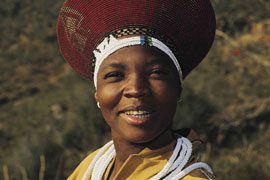South African Languages and Culture
South Africans have been referred to as the 'rainbow nation', a title which epitomises the country's cultural diversity. The population of South Africa is one of the most complex and diverse in the world. Of the 45 million South Africans, nearly 31 million are Black, 5 million White, 3 million Coloured and one million Indian. The population density is 32.9 people per km².
The Black population is divided into four major ethnic groups, namely Nguni, Sotho, Shangaan-Tsonga and Venda. There are numerous subgroups of which the Zulu and Xhosa (two subgroups of the Nguni) are the largest. The majority of the White population is of Afrikaans descent (60%), with many of the remaining 40% being of British descent. Most of the Coloured population live in the Northern and Western Cape provinces, whilst most of the Indian population lives in KwaZulu Natal. The Afrikaner population is concentrated in the Gauteng and Free State provinces and the English population in the Western and Eastern Cape and KwaZulu Natal.
There are eleven official languages in South Africa, namely English, Afrikaans, Ndebele, Sepedi, Xhosa, Venda, Tswana, Southern Sotho, Zulu, Swazi and Tsonga.
The Black population is divided into four major ethnic groups, namely Nguni, Sotho, Shangaan-Tsonga and Venda. There are numerous subgroups of which the Zulu and Xhosa (two subgroups of the Nguni) are the largest. The majority of the White population is of Afrikaans descent (60%), with many of the remaining 40% being of British descent. Most of the Coloured population live in the Northern and Western Cape provinces, whilst most of the Indian population lives in KwaZulu Natal. The Afrikaner population is concentrated in the Gauteng and Free State provinces and the English population in the Western and Eastern Cape and KwaZulu Natal.
There are eleven official languages in South Africa, namely English, Afrikaans, Ndebele, Sepedi, Xhosa, Venda, Tswana, Southern Sotho, Zulu, Swazi and Tsonga.
Useful Zulu Phrases / Words
| English Greetings | Zulu Greetings: |
| Hi! | Sawubona! (to a person) Sanibona! (to persons) |
| Good morning! | Sawubona! (to a person) Sanibona! (to persons) |
| Good evening! | Sawubona! (to a person) Sanibona! (to persons) |
| Welcome! (to greet someone) | Ngiyakwemukela! (to a person) Ngiyanemukela! (to persons) |
| How are you? | Unjani? |
| I'm fine, thanks! | Ngikhona, ngiyabonga! / Ngiyaphila, ngiyabonga! |
| And you? | Wena unjani? |
| Good/ So-So. | Ngisaphila! / Angiphili kakhulu! |
| Thank you (very much)! | Ngiyabonga (kakhulu)! |
| You're welcome! (for "thank you") | Kulungile! |
| Hey! Friend! | Heyi! Mngani! |
| I missed you so much! | Ngikukhumbulile kangaka! |
| What's new? | Zithini ezintsha? |
| Nothing much | Lutho oluningi! |
| Good night! | Lala kahle! (to a person) Lalani kahle! (to persons) |
| See you later! | Sizobonana! |
| Good bye! | Sala kahle! (to a person staying) Salani kahle! (to persons staying) Hamba kahle! (to a person leaving) Hambani kahle! (to persons leaving) |
SOUTH AFRICAN LANGUAGES
IsiZulu or Zulu is one of the official languages of South Africa. 10 million people speak the language and most of these people live in South Africa.
24% of South Africans, Zulu is considered to be their home language and 50% of the South Africa’s inhabitants understand the language.
The Zulu nation came into existence around the 14th century. Although there are many Bantu migrants, back then Zulu language adopted many of the sounds that make up the language from the San and from the Khoi. The San and the Khoi were the first residents in South Africa. Evidence of this is the Zulu’s clicking consonants used in their language. Other indigenous languages before were all oral languages until missionaries from Europe arrived. This was the time Zulu became written - when missionaries that had arrived jotted down the interesting facts concerning this language using a Latin alphabet. The year was 1883, and this was the year the first book containing the Zulu language was produced - A Bible.
24% of South Africans, Zulu is considered to be their home language and 50% of the South Africa’s inhabitants understand the language.
The Zulu nation came into existence around the 14th century. Although there are many Bantu migrants, back then Zulu language adopted many of the sounds that make up the language from the San and from the Khoi. The San and the Khoi were the first residents in South Africa. Evidence of this is the Zulu’s clicking consonants used in their language. Other indigenous languages before were all oral languages until missionaries from Europe arrived. This was the time Zulu became written - when missionaries that had arrived jotted down the interesting facts concerning this language using a Latin alphabet. The year was 1883, and this was the year the first book containing the Zulu language was produced - A Bible.

Zulu Woman
Zulu is now a language that has become wide spread in Africa. It is especially spoken in KwaZulu Natal, which is also known as “Land of-the Zulu”. Other countries in Africa where this language is spoken are Swaziland and Lesotho, which are also South Africa’s very close neighbours.
South African English has adopted many Zulu words into its vocabulary. Some of the words include ubantu (humanity), donga (ditch), indaba (conference) and muti (medicine). Two Zulu animal names are used in Standard English, and these are the Impala (proper name) and the Mamba (poisonous snake). If you are considering learning a South African language, Zulu would probably be suggested by many. The main reason is that the language is not difficult to understand and it is widely used and understood.

No comments:
Post a Comment